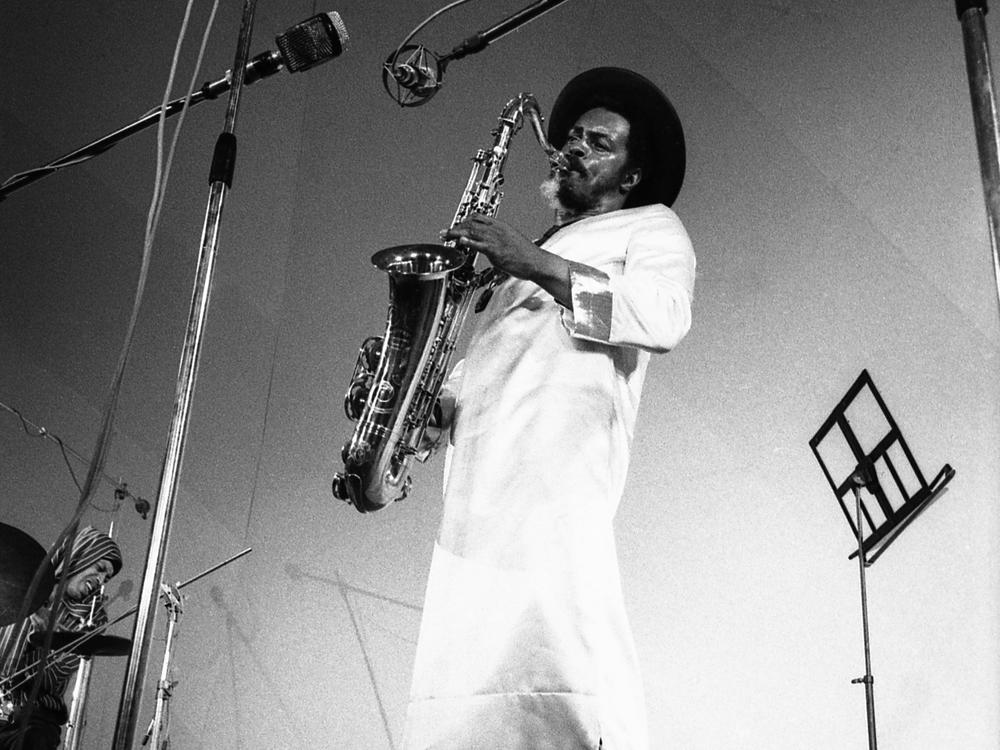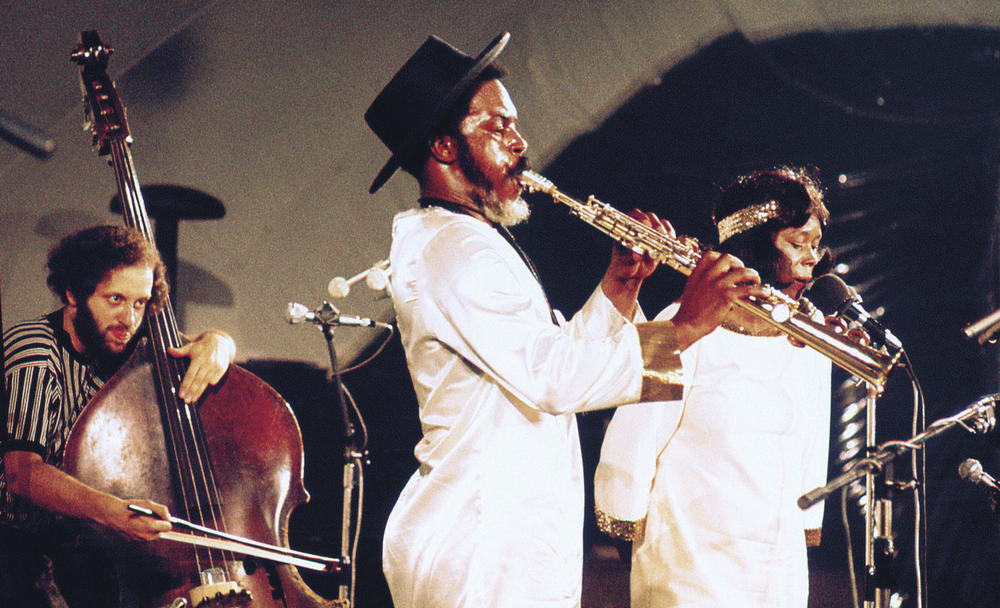Section Branding
Header Content
Albert Ayler made sublime music. The world was not ready
Primary Content
A tenor saxophone hops over an interval like it's a turnstile. And for a moment, the energy alight from two hours of hard-blown, soul-cleansing music seems on the edge of redoubling its power. But fingers fly over piano keys to settle on floating blocks of sound — restless, yet slow, like a train chugging up a hill. The saxophone responds in kind, not so much dancing or dragging around the melody, but reshaping its purpose: resilient, beautiful, final. "Music is the healing force of the universe," a voice intones with deep vibrato, as sax, piano, upright bass and skittering drums undulate, seemingly in perfect waveform with the vibration. The stately theme, one that's been echoed by several musicians over many decades, exalts not its creators but creation.
This is not Albert Ayler's last love cry, but it's the last one we can hear.
"Music is the Healing Force of the Universe" begins and ends Revelations: The Complete ORTF 1970 Fondation Maeght Recordings. The gorgeous box set — one of many archival jazz gems recently released under the care of producer Zev Feldman — features unseen photos, extensive liner notes and commentary from Ayler's daughter, critics, producers and musicians. But more importantly, Revelations restores two full sets performed by the tenor saxophonist's band, just months before Ayler was found floating in New York City's East River. The circumstances around his death remain a mystery, but listening to these concerts — recorded July 25 and 27, 1970 — there's a sense that Ayler was a musician in transition, the primordial yawp of his saxophone sparkling anew from the music of his youth.
Born in Cleveland and raised in Shaker Heights, Ohio, Ayler first learned the alto saxophone from his father; he cut his teeth in church and joined blues harmonica player Little Walter's band as a teenager. He fell in love with martial music — fanfares, marches and bugle calls — as an enlisted member of the United States Army on assignment in France. (That's also where Ayler switched to tenor.) He briefly moved to Stockholm where he sat in on Cecil Taylor's band — some of those recordings can be on Holy Ghost: Rare & Unissued Recordings (1962-70).
But in 1963, Ayler had moved to New York City where he became an outlaw of avant-garde jazz. He'd overblow his instrument, growling — yet somehow, also grinning — into his horn. On albums like Spirits and Spiritual Unity (both released on ESP-Disk'), his music didn't sprawl so much as constantly explode. Even at the dawn of the New Thing, Ayler's skronk and scrawl challenged the most adventurous.
Ayler's run for Impulse! Records was met with mixed reviews. 1968's Love Cry was the grand reintroduction to Ayler's firebrand, but, at the time, folks weren't sure what to make of the R&B-honkin' New Grass and the vocal-heavy, grand opus Music is the Healing Force of the Universe, both co-written with his manager and romantic partner Mary Parks. Black musicians then, as now, weren't afforded the freedom to exist in several spaces; you could be jazz, R&B, rock, blues or gospel, but rarely all at once.
Albert Ayler wanted to make unapologetic, all-encompassing, sublime and joyful music. The world was not ready. But at Fondation Maeght in 1970, those seemingly disparate worlds achieved spiritual unity.
Fondation Maeght is a modern art museum established in 1964 by Marguerite and Aimé Maeght outside Nice, France. Its musical advisor at the time, Daniel Caux, was an early advocate for American free jazz and minimalism. In a program dubbed Nuits de la Fondation Maeght, Caux booked the Sun Ra Arkestra, Terry Riley, La Monte Young and the Merce Cunningham Ballet to perform in a newly constructed geodesic dome that shared grounds with sculptures by Joan Miró, Alexander Calder and Alberto Giacometti. For American musicians used to playing dive bars and dusty lofts for gas money, here was an opportunity for forward-thinking sound sculptors to match their physical environment in deluxe style and accommodations, not to mention receive the ecstatic appreciation of European listeners, more eager than most for this music.
Albert Ayler's band at Fondation Maeght was a mix of regulars — Mary Parks (soprano saxophone, vocals) and Call Cobbs (piano) — and newcomers — Steve Tintweiss (bass) and Allen Blairman (drums). In Revelations' liner notes, Tintweiss' account proves crucial to understanding these concerts and the character of Ayler. The bassist had played on ESP-Disk' albums by Patty Waters, Frank Wright and Burton Greene, and sat in on a Greene gig with Ayler at Slugs' Saloon in Manhattan — that's why, when another bassist dipped out of the Fondation Maeght gig, Tintweiss was the first call. "There was no sheet music," he recalls, "no rehearsals. He just said, 'You start off with the bass and I'll come in and we'll take it from there.'"
That bears out on the first night, especially since Cobbs missed his flight. The band is rearing and wild, barreling into the free-form spirit completely off the dome. Ayler, calling on his coming-of-age fanfares and hymns, is a master of both melody and chaos, but always returns to song's quintessential ceremony. You hear that on the career-spanning one-two-three punch of "Ghosts," "Love Cry" and "Desert Blood" — the band swings and swerves, but never loses sight of each song's center. The numbered "Revelations" throughout are pure improvisations, though not without statement; Mary Parks, who primarily sang and wrote on late-era Ayler studio recordings, particularly shines as a soprano sax foil to her husband.
By the second night, now with 1500 people in the audience, Cobbs got on a plane and returned to the fold. He is the through line to the last five years of Ayler's unpredictable catalog — often at the harpsichord — but was something of a traditionalist on keys. He favored chord changes and arpeggio flourishes straight out of bandstand glam — he could almost be called a square in a band of misfits. On "Truth is Marching In," Cobbs attempted to reign in the rapturous discord with playful runs up and down the piano (since a harpsichord was not available). But by the same token, Cobbs' fanciful upper register forced Ayler to stretch his upper range, producing an angelic take on the martial theme. Ayler knew something we didn't. (Unfortunately, just two months after the Fondation Maeght gig, Cobbs was killed in a hit-and-run accident.)
Revelations is a constantly moving but holistic view of Ayler's works. Song after song, we aren't tossed across eras but guided by a force most triumphant. Take, for example, Allen Blairman's frenzied drums that scatter across Call Cobbs' ragtime theatrics on "Spirits," and how it winds up "Thank God for Women," an R&B rave-up rhapsodically sung by Ayler that he hoped might be a pop hit. All of this music made sense in Ayler's soul, and in these live recordings, presented in full for the first time, we can see both the spark of Ayler's radical sound and the echo that's still repeating: Music is the healing force of the universe.
Copyright 2022 NPR. To see more, visit https://www.npr.org.


